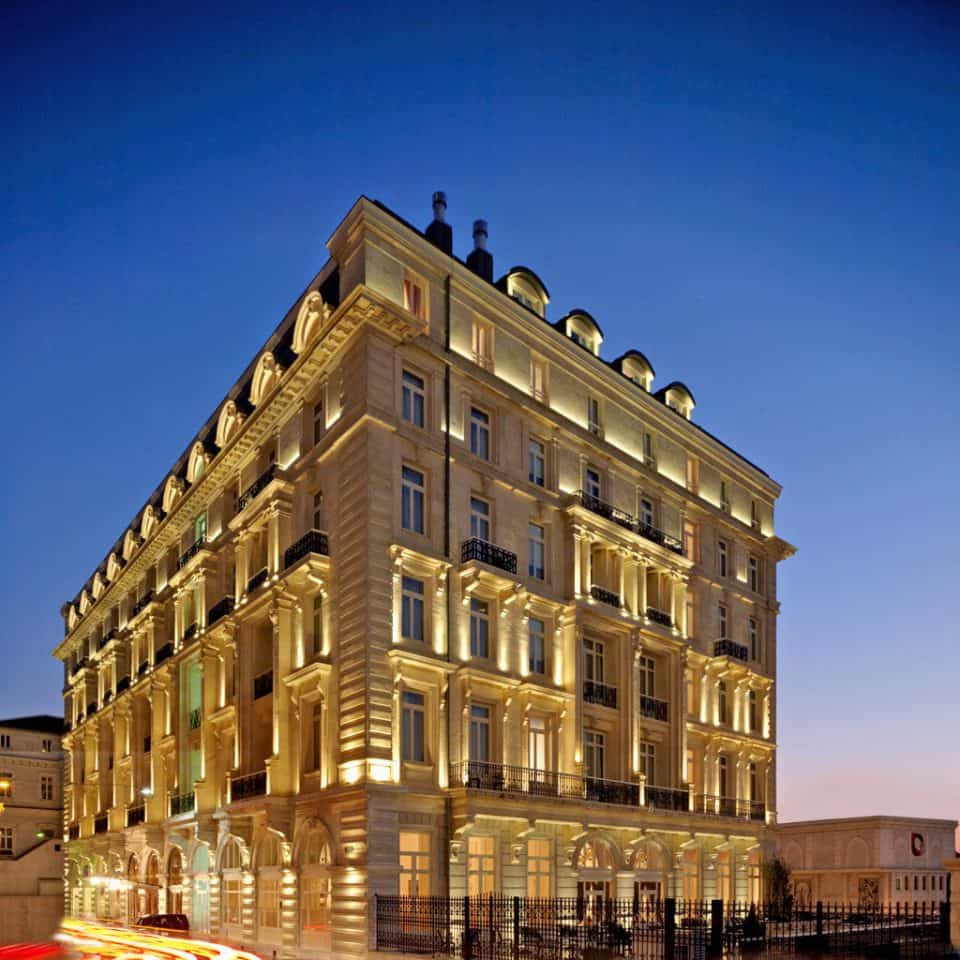To all of you fans of the pre-war period, I would like to recommend George King’s novel called “Midnight at the Pera Palace: The Birth of Modern Istanbul”. It describes the New Year’s Eve celebration in this hotel in 1926 when Turkey first started to use a uniformed calendar and timekeeping. In the 1920s, Istanbul was anything but Muslim and Turkish – it was brimming with foreign soldiers who occupied the city after the Great War, the White Russians who fled the October Revolution, local Armenians, Greeks and Jews, jazz musicians, adventurers and spies from all over the world.
Ilham Gencer is 92 years old and every afternoon, between 3 and 5 pm, he plays the piano at the Kubbeli Saloon of the Pera Palace Hotel in Istanbul. Short and thin, wearing a blazer in the colour of apricot, Gencer takes the audience, sipping on their afternoon tea, by surprise with his booming voice. From the all-time greats like Frank Sinatra and Elvis to Turkish ballads, Ilham sings every single afternoon thus solidifying his position in the Parthenon of the legends that live in the modern-day Istanbul.
Hotels with ‘surplus history’, as it were, have a special charm that modern, luxury resorts with their swimming pools and glass walls instead of windows can never exude. In terms of its history, famous guests and the charm it has retained to this day, Pera Palace is at the top of historic hotels. Only the Excelsior in Lido, near Venice, The Plaza in New York City, the Copacabana Palace in Rio, the Alfonso XIII in Seville, the Hotel de L’Europe in Amsterdam and the Claridges in London can compare.
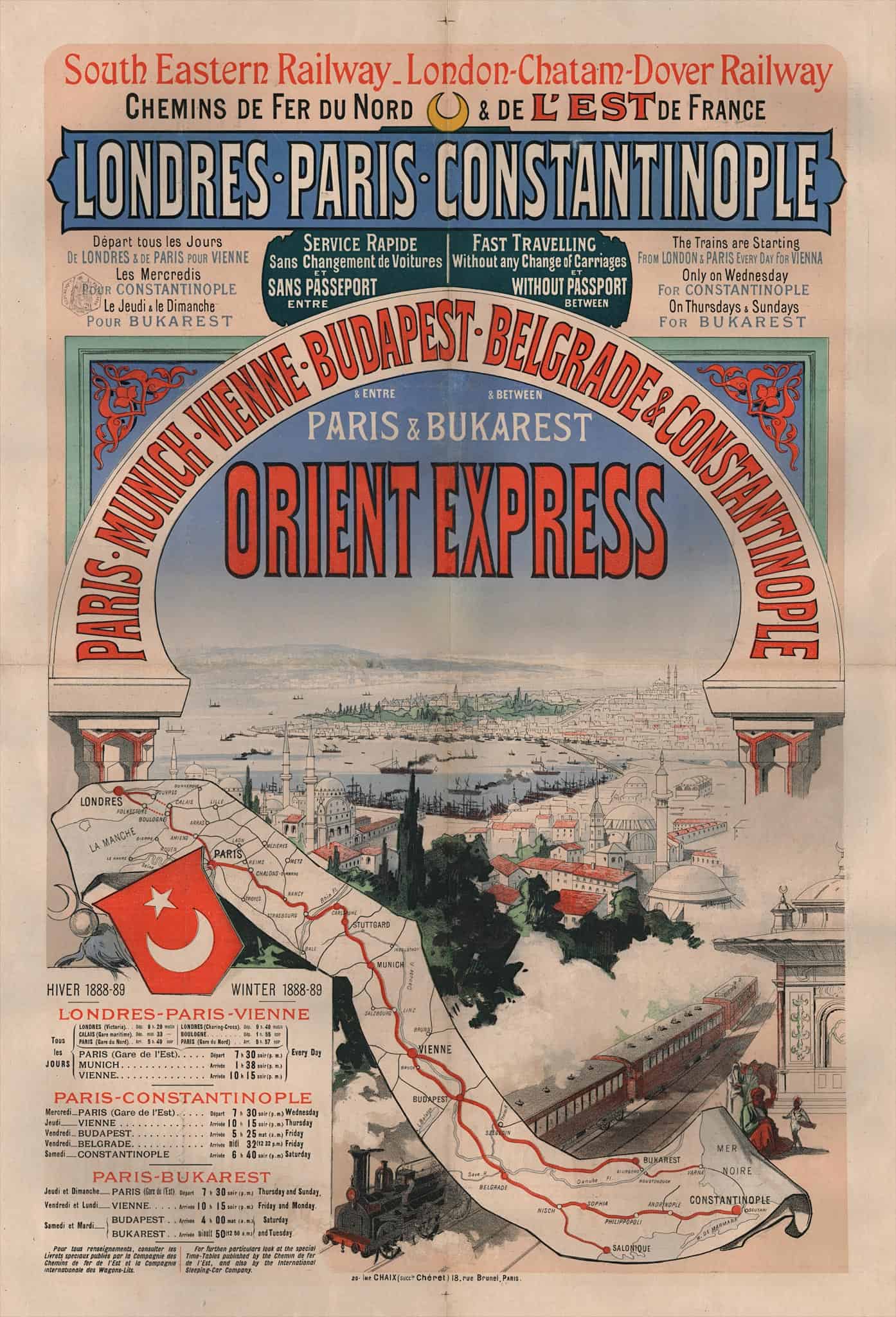
So, how did it all begin? Following the Berlin Congress in 1878, Obrenović-ruled Serbia was ordered to start building a railroad as a link to the continental Orient Express route – Paris-Istanbul. On September 4th, 1884, Milan Obrenović officially opened the Belgrade-Niš railroad and the trains were free to go. However, the prestigious passengers of the Orient Express couldn’t find an adequate hotel for themselves in the city that was back then called Constantinople. Hence, the company that owned the Orient Express decided to initiate the construction of ’the first European hotel’ in the capital city of the Ottoman Empire. The Turkish architect of French origin, Alexander Valaury was chosen for the job. Valaury was known for designing some of the most beautiful buildings in Istanbul such as Cafe Lebon, the Hidayet Mosque, the headquarters of the Imperial Ottoman Bank, the building that housed the Archeological Museum and others.
The construction started in 1892. Three years later, the hotel was finished and officially opened with a great ball. It was named after the Istanbul quarter of Pera in which it is located. Valaury used a combination of several styles in designing the hotel – Neoclassicism, the Art Nouveau style of the then epoch and Oriental. Above the hotel’s tea room there are specially designed domes, which open as required so that the warm air can go out during hot days in Constantinople. Before the invention of the air conditioner, this feature proved to be invaluable.
Passengers were transported in special carriages from the Main Railway Station to the hotel, down the steep streets of Constantinople, which were not suitable for horse-drawn carriages. These carriages were luxury “one-seaters”, resting on wooden bars, carried by two men.
Before the Great War, the hotel was known for its famous guests – from Queen Victoria and Emperor Franz Josef to our royal families the Obrenović and the Karadjordjević who stayed at the hotel when they came for official visits to the Port.
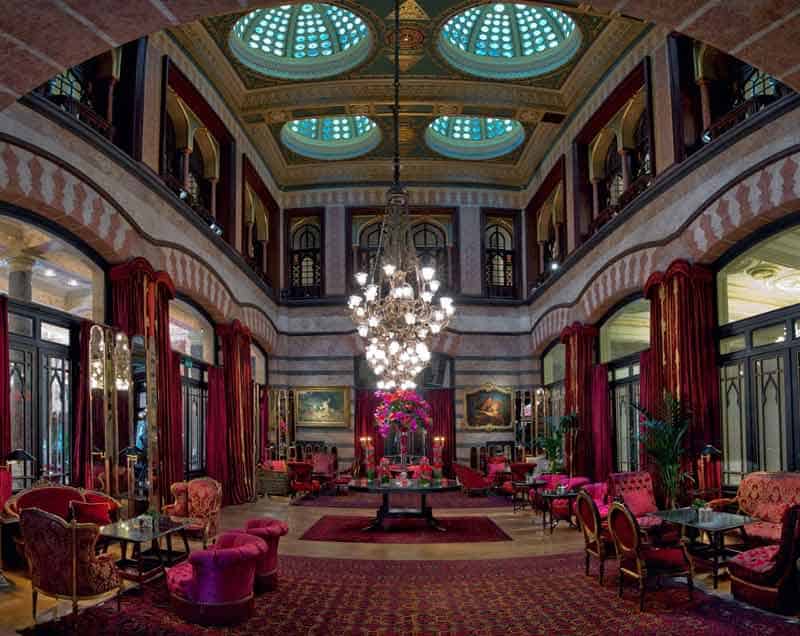
Pera Palace was the first hotel in Turkey to have electricity and a lift which was manufactured by the renowned Swiss company, Schindler. The company still exists today and has no relation to the famous Oscar Schindler. We had a ride in the lift from the ground to the first floor, to the room in which ‘the father of modern Turkey’, Mustafa Kemal Ataturk stayed in 1919. Just before the end of the Great War, as the capital of defeated Turkey, Constantinople was occupied by the allies (Great Britain, France and Italy). The then Defence Minister, Kemal Ataturk used the hotel for negotiations with the allied generals about ending the occupation. This was the first time that Constantinople was controlled by a foreign army since the fall of the Byzantine Empire in 1453.
In the memorial room, you can see the saloon where Ataturk stayed, his bedroom, bathroom and a clock, just like the one at the Dolmabahce Palace, which stopped at 9:05 am, the time when the father of the Turkish nation died. The tours of the memorial room are free of charge and take place every day between 10 and 11 am and 3 and 4 pm.
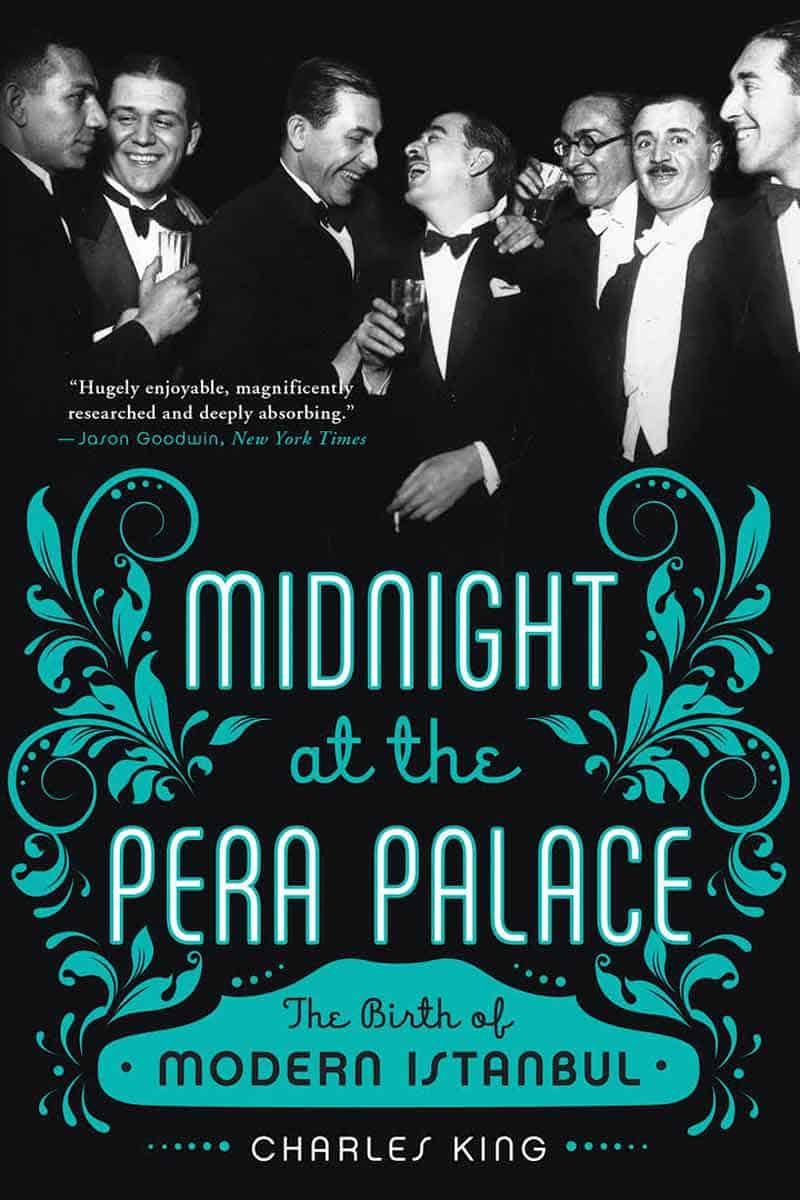
I have travelled to more than 80 countries on 5 continents, and in all of those countries, I saw the pictures of their current rulers, kings, queens, presidents and an occasional prime minister, hanging in public places. But Turkey is special in celebrating its leader who died more than 80 years ago. The legacy of Mustafa Kemal Ataturk (1881-1938) can be seen in millions of his portraits that hang all over Turkey, in hotels, at airports, in restaurants, bars and markets. The picture of the current Turkish president Erdogan plays second fiddle to Ataturk’s image at Istanbul Airport, and it is Ataturk that will forever be the undisputed leader of Turkey. This is a leader that was not a nationalist or a populist, who banned hijab, made Turkey into a secular state, and transformed the Hagia Sophia Mosque into a museum in honour of what it used to be in 1453. „If he only could have ruled three times 15 years, we would have been developed as today’s Germany or America“, a tour guide at the Dolmabahce Palace told me, whose parents moved from Tetovo in Macedonia to Istanbul some 60 years ago.
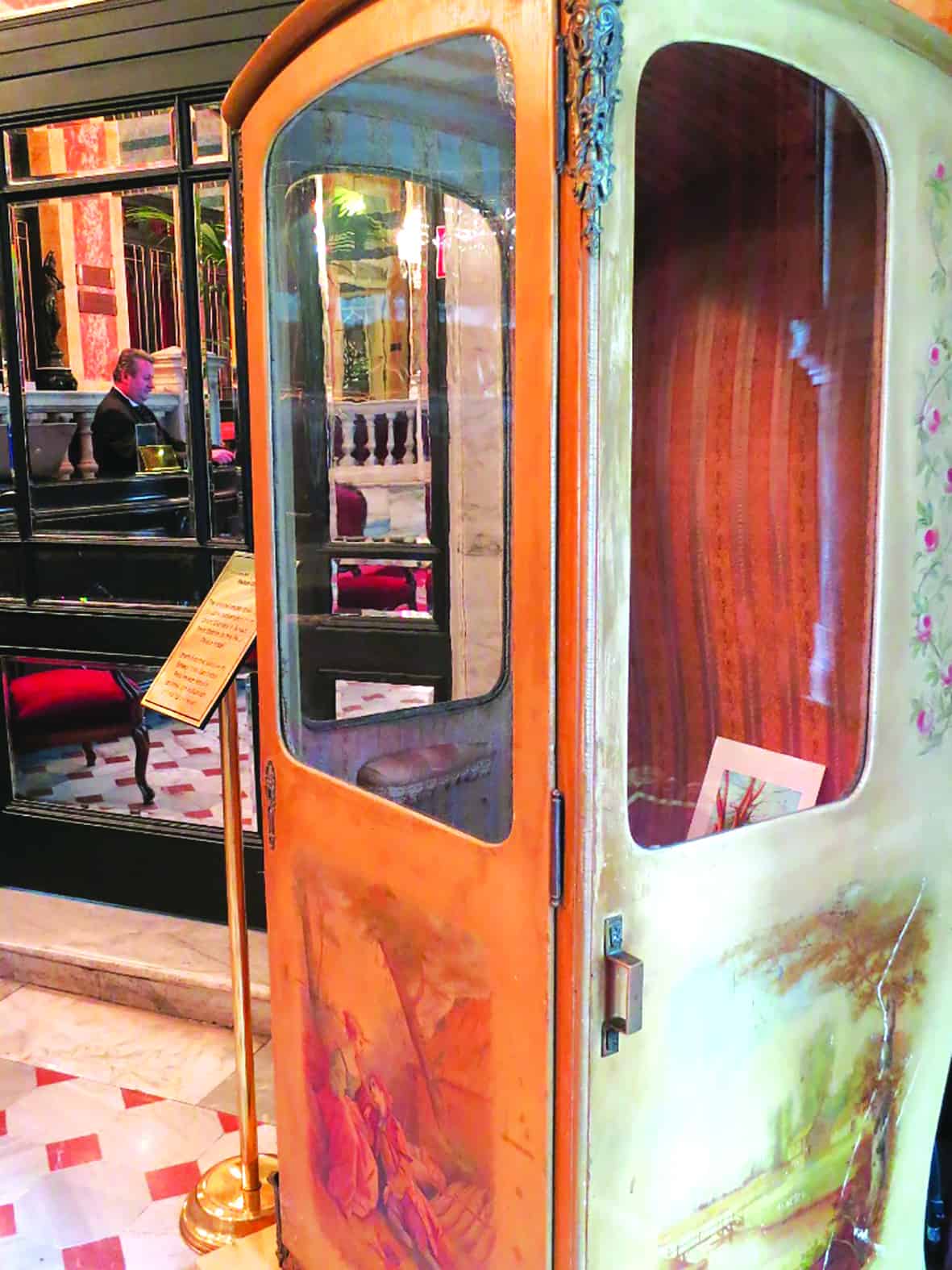
The end of the occupation of Constantinople and the Greek-Turkish war saw the return of “civilian” guests to Pera Palace. One of the most famous among them was Agatha Christie who stayed at the hotel in 1934, in room 411, where she, as many believe, wrote the largest part of her novel “Murder on the Orient Express”. At that time, Ernest Hemingway visited the hotel too (Harry, the hero of his novel “The Snows of the Kilimanjaro” stays in Pera Palace in the book), as did Alfred Hitchcock, Greta Garbo, Zsa Zsa Gabor and other rich and famous people from that era.
To all of you fans of the pre-war period, I would like to recommend George King’s novel called “Midnight at the Pera Palace: The Birth of Modern Istanbul”. It describes the New Year’s Eve celebration in this hotel in 1926 when Turkey first started to use one calendar and timekeeping. Istanbul in the 1920s was anything but Muslim and Turkish – it was brimming with foreign soldiers who occupied the city after the Great War, the White Russians who fled the October Revolution, local Armenians, Greeks and Jews, jazz musicians, adventurers and spies from all over the world.
Just before the start of the Second World War, an interesting guest stayed at Pera Palace. He wasn’t famous by any stretch of imagination back then and was travelling from Moscow to Belgrade. He stayed at this hotel for three months in 1940, waiting for his passport to arrive. The mysterious guest is a communist activist Josip Broz, who will a year later, under the nickname Tito, launch a partisan uprising against the Nazis in occupied Yugoslavia. The passport finally arrived in Istanbul, brought to him by another young Communist activist called Herta Has. The two fell in love in Tito’s room at Pera Palace, Herta became Tito’s second wife, and next year, their son, Miša Broz, was born in Zagreb.
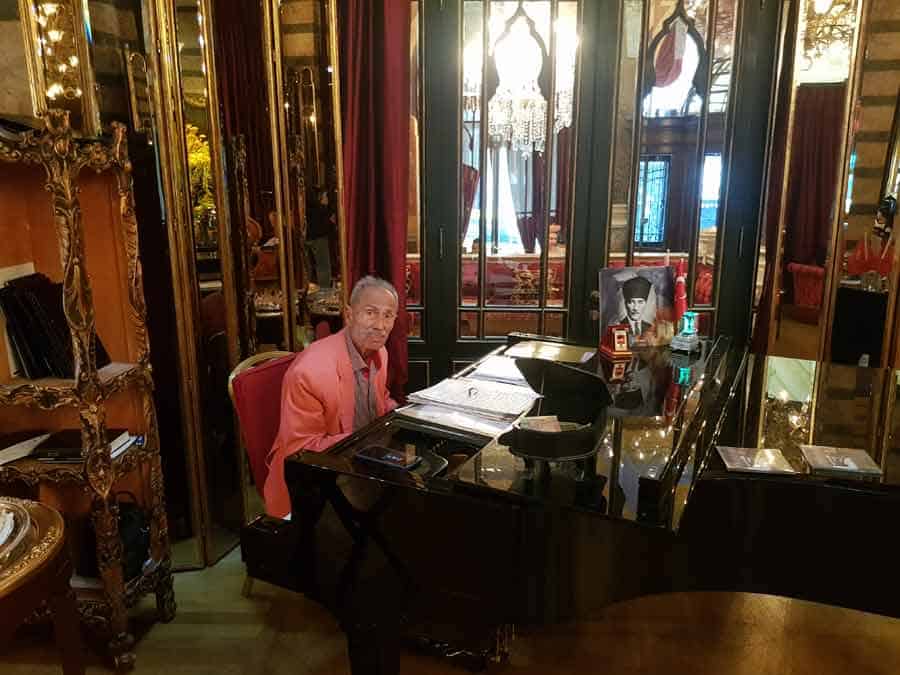
During the Second World War, Turkey proclaimed neutrality, so Istanbul, like Lisbon or Tanger, was the hub of spies from all sides. The spies from the Axis Powers gathered at the Park Hotel while the allied spies met at Pera Palace. In 1941, the Nazis activated a bomb at the main entrance to the hotel that significantly damaged the building.
The hotel that survived the fall of the Ottoman Empire, the birth of the Republic, the two world wars, the expulsion of the Greeks from the city in 1955 and several military strikes, became yet again popular with tourists in the postwar period.
On March 7th, 1979, apartment 411 at the hotel was besieged with journalists from all over the world for a very bizarre reason related to the disappearance of Agatha Christie in 1926. Back then, for the whole 11 days, nobody could find Agatha. Later, she was found at a hotel in Yorkshire in England. She claimed she could not remember where she had been for 11 days. The Warner Brothers film company started making a movie about this event in August 1979 with Dustin Hoffman and Vanessa Redgrave in main roles. The company hired the famous Hollywood clairvoyant, Tamara Rand to get in touch with the spirit of the late writer. The clairvoyant claimed that the spirit of Agatha Christie had appeared to her and told her that there was a key hidden by the famous writer in the apartment 411 of the Pera Palace Hotel, between the wooden boards and the wall. During the live satellite broadcast on a US TV station, an 8-centimetre long key was found between the front door of the apartment and the floor. The hotel manager retained the key and the clairvoyant disclosed that the key opened a large box containing Agatha’s unpublished diaries. The box was never found, nor did the diaries, and the mystery of Agatha’s 1926 disappearance remains unresolved to this day.
On the last day of our stay at the hotel, we see Ilham entertaining guests from Taiwan and playing a Chinese national ballad. Ilhan, who, as a teenager, was old enough to meet Josip Broz, is full of strength and energy. He greets us in the Serbian language and continues singing Sinatra’s song “My Way”, as new guests, eager to experience the glorious epoch when Agatha Christie and Ernest Hemingway stayed here, are entering the saloon.

Rođen 27.7.1968. u Baču (Vojvodina, Srbija). Srednju školu završio u Bačkoj Palanci, Pravni fakultet studirao u Novom Sadu. Od 1990. radi kao novinar – u početku kao novosadski dopisnik beogradskih “Večernjih novosti”; zagrebačke “Arene”, sarajevskih “Naših dana”. Sarađuje i u magazinima “Vreme” i “Stav”.
1992. sa grupom studenata obnavlja izlaženje studentskog mesečnika “Index”. Posle dva broja sledi smena celokupne redakcije i pokretanje magazina “Nezavisi Index” koji će kasnije 1993. promeniti ime u “Svet” iz kojeg je nastala izdavačka kuća Color Press Grupa.
Danas na čelu Color Press Grupe najvećeg izdavača magazina u regionu sa kompanijama u svih 6 republika – 110 magazina, 25 internet portala i preko 80 konferencija i festivala godišnje.
U porfoliju kompanije pored domaćih (poput magazina “Lepota i zdravlje”, “Svet”, “Pošalji recept”, “Lekovito bilje” itd) nalaze se i brojni licencni brendovi: “The Economist”, “Hello!”, “Gloria”, “Story”, “Star”, “Lisa Moj stan”, “Hausbau”, “Brava Casa”, “Bravo”, “Alan Ford”, “Grazia”, “La Cucina Italiana”, “Auto Bild” i brojni drugi.
